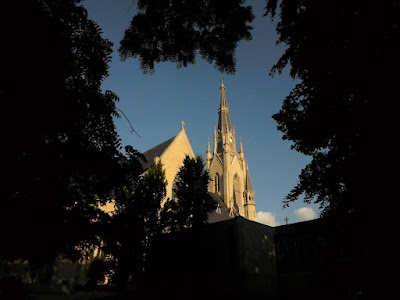The dimensions of time and
space limit the ability of humankind to recognize this Authentic Self or human
dignity, at least fully. The reliance on material epistemology to know what is
True about human dignity conditions the individual to a certain perception of
human beings and dignity within the context of a given time and space and fails
to see the entirety of humankind. Simply put, we often become easily fixated on
the material Truths of human dignity and the Authentic Self, and this fixation
can cause us to forget about the deeper, more mysterious and more profound
realities of who we are made to be. I tell my students to think about the Pit.
I draw a picture of myself at the bottom of the Pit, and, in the picture, my
eyes are looking downward and never up. I remind students that the top of the
Pit is so far away that it is almost as if it doesn’t exist to me; if I can’t
see it, then it must not exist. My entire perception of reality, including my
human dignity and my Authentic Self, then, becomes conditioned by what I can
observe and study in the Pit around me. The next step is a little complicated,
but it takes some logic, which, if I go slowly, my students can understand. I
tell them, “The Pit around me conditions my perception of Truth, but what if
there was not Pit? What if I was outside of the Pit where there are no
limitations? How do we describe ourselves without those conditions of being in
a Pit?” I lob this one across the plate.
A student raises their hand. “Well, I
guess you could say that outside of the Pit we are unconditioned and free to
know the Truth of who the Authentic Self is.” I smile. The unconditioned self’s perception
of human dignity is not limited by time and space. The self and the other is
viewed as having equal dignity. I do not push it right now, but some of my
students remember that based on this model or this analogy, only God is Truly
free to see us as Beloved; only God can really see us for what we are made to
be. But if we could somehow tap into that vision that God has of us, maybe we
can be free too?
 |
| The Basilica of the Sacred Heart, Notre Dame, Indiana. Sometimes, if we are looking, we can see greater Truths outside of the darkness of time and space. (P. Smith) |
No comments:
Post a Comment